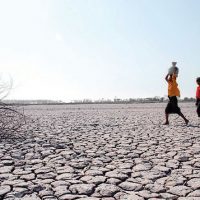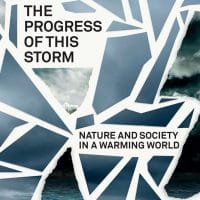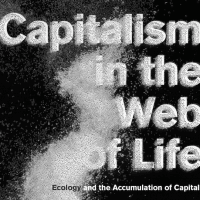-
Eco-Marxism and deforestation
The article uses the Eco Marxist perspective to look at deforestation and the impact it has on Earth in terms of soil erosion, air pollution and the threat it places on plant and animal life.
-
Channel the panic into political action
A conversation with Andreas Malm about the impotence of postmodernism in face of climate change and capital’s role in the destruction of nature.
-
Earth’s circular economy: recycling as a law of life
On every scale, from the smallest cells to the entire planet, the essential elements of life are constantly used and re-used. Biogeochemical cycles are the basis of the biosphere.
-
Marx’s ecology: recovered legacy
While mainstream ecological theory has been dismissive of Karl Marx, serious research in recent decades has recovered some of his very important insights on ecological issues. The most systematic and thorough investigations on Marx’s ecological views are those of John Bellamy Foster and his friends from Monthly Review.
-
Biofinance
Capitalism has been the subject of too many conflicting definitions for any of the claims that follow to have any purchase on truth — understood as an adequation to the real. Beneath the numerous disagreements, however, a common substratum can be gleaned between the liberal Smithian, and the classical Marxist and Weberian positions: capitalism is a system geared at fostering accumulation for its own sake.
-
The progress of this storm
Andreas Malm’s powerful critique of current environmental philosophies puts historical materialism and cutting-edge science at the center of a call for militant action.
-
‘Socialism a necessity for human survival’
According to John Bellamy Foster, the world environmental crisis is a systemic crisis, a product of capitalism, and requires systemic changes in the capitalist system. He says that environmental sustainability is incompatible with capitalism.
-
Ecology and value theory
Jason W Moores Capitalism in the Web of Life sets itself the challenge of locating an account of capitalist commodity production inspired by Karl Marx within the biological, chemical and geological totality we normally call nature. The ambition of the book is therefore immense. Moore proposes a method for understanding world history that shows how economic development is connected to long-wave ecological transformations. At a time when humanity faces profound and simultaneous ecological and economic crises, Moore proposes a kind of meta-theory that explains them as the outcomes of a single logic.
-
More than 15,000 scientists from 184 countries issue ‘warning to humanity’
“Our mandate is that we take care of Earth and earthlings and human beings because we’re all family.”
-
Stuart Hall’s deconstruction of fate
The island of Barbuda is currently devoid of human life, a bleak reality that is both unfathomable in its scope and seemingly inevitable under the conditions of racialized capitalism. The severity of Hurricane Irma’s impact was undoubtedly worsened by the gross consumption of natural resources, particularly by nations that historically benefitted from colonialism and the construction of empire.
-
Foreword to Creating an Ecological Society
As Fred Magdoff and Chris Williams point out in their new book, Creating an Ecological Society, the word “ecology” (originally œcology) was first coined in 1866 by Ernst Haeckel, Darwin’s leading German follower, based on the Greek word oikos, or household. Ironically, the word “economy,” to which ecology is often nowadays counterposed, was derived much […]
-
Memo to Jacobin: Ecomodernism is not ecosocialism
Ecomodernism is incompatible with ecosocialism. If Jacobin recognizes that and changes course, it can make important contributions to the fight against climate change.
-
Militant particularism and ecosocialism
Marx showed how history was materially transformed through a series of contradictions toward greater complexity, but held out the promise of one particular class representing the universal interests of humanity, if activated within objective conditions by political agency. The problem today is that cyclical and conjunctural crises that have propelled capitalism to hegemonic global reach and to the point of near absolute structural crisis have also eliminated resistance in the form of a consequential collective agent that would avert ecological collapse.
-
The earth shall rise on new foundations
The United States is sometimes viewed as the most extreme capitalist society on earth. The decision of the newly elected Trump administration to withdraw from the Paris Climate Agreement would seem to affirm such a judgment. It highlights the fact that while capitalism cannot solve the environmental problem, a more extreme capitalist society can, if it is not stopped, eliminate all possibility for a future sustainable society, by accelerating the runaway train to catastrophe represented by today’s business as usual.
-
The trouble with geoengineers “hacking the planet”
To be sure, I can actually imagine a world in which a small and strictly limited amount of albedo modification could sensibly be deployed as a complement to strong and largely successful efforts to bring carbon dioxide emissions towards zero, accompanied by successful deployment of technologies for actively removing the gas from the atmosphere. But that would be a world with a truly exceptional level of international agreement, fact-based decision-making, and cooperation towards shared goals. A world where somebody like Donald Trump can become president of a superpower is not that world.
-
The Rift in the Metabolism of Nature and Society
The truth is that the environmental problems and the mounting catastrophes facing humanity have everything to do with economic and environmental injustice and a society that put the accumulation of capital before people and the planet. This is so much the case that we will increasingly see the development of an environmental proletariat where the working class broadly speaking, accounting for the greater part of humanity, will be increasingly drawn together by the need to respond to deteriorating material conditions in which the distinction between say the material conditions on the job and life conditions in general will more and more dissolve.
-
Joan Acker, Socialist Feminist
Joan Acker, who died on June 22, 2016, was one of the foremost socialist feminists of the late twentieth and early twenty-first centuries. Her work about gender and class drew much of its creativity from a continual though uneasy engagement between feminism and Marxism. She was one of the initial subscribers to Monthly Review, beginning […]
-
The only force that can combat imperialism today is a worldwide struggle of workers
Marxism as a philosophy of praxis is inescapable, since it sums up the revolutionary potential for human emancipation and sustainable human development.
-
Ellen Meiksins Wood: Some Personal Recollections
In my graduate class on Political Economy at the University of Oregon this term we are reading two books by Ellen Meiksins Wood: The Retreat from Class and Democracy Against Capitalism. Tomorrow, when the class meets, I will have to inform the students of Ellen’s death on January 14. I have been thinking about what […]
-
Climate Change and the Summit Smokescreen
Ian Angus is editor of the ecosocialist journal Climate & Capitalism. He is co-author, with Simon Butler, of Too Many People? Population, Immigration and the Environmental Crisis (Haymarket, 2011), and editor of the anthology The Global Fight for Climate Justice (Fernwood, 2010). He talked to Phil Gasper about what to expect from the Paris summit […]















